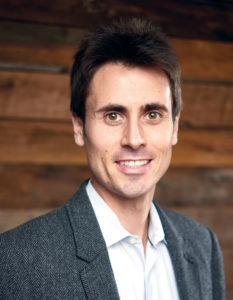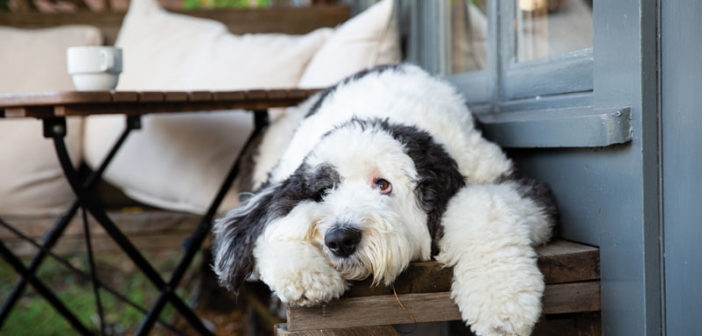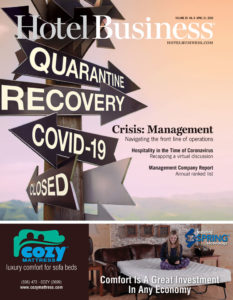 My sheepdog has been working overtime for the past week plus. I’ve been relying on him heavily during this period of exile, and he’s been both an exceptional companion and a welcome distraction. He’s shown himself to be a natural emotional support animal—no formal training needed. Perhaps it’s innate and he merely sees me as one of his sheep? No matter, it’s a good thing “social distancing” doesn’t apply to dogs.
My sheepdog has been working overtime for the past week plus. I’ve been relying on him heavily during this period of exile, and he’s been both an exceptional companion and a welcome distraction. He’s shown himself to be a natural emotional support animal—no formal training needed. Perhaps it’s innate and he merely sees me as one of his sheep? No matter, it’s a good thing “social distancing” doesn’t apply to dogs.
This crisis has been a great reminder of how quickly our lives and social order can be completely upended. How different things were just a few weeks ago, when we were all immersed in our own pursuits—be it a business, a project, or perhaps even an upcoming wedding or move. While we inevitably had the usual fears and anxieties inexorably linked to daily life, we also had our routines, our interests, our aspirations and our community to counterbalance them. Wherever we were on the ever-shifting life spectrum from challenge to prosperity, we experienced it in a realm of relative normalcy.
Now, we face a total upheaval, having to put everything aside and instead evaluate and try to make sense of this crisis. How bad is it? How long will this last? Am I at risk? Are my loved ones at risk? Am I overreacting or not being cautious enough? When will the toilet paper be restocked at the store?
Our routines have been completely disrupted. We’re working from home. Our children are schooling from home. Some of us have had to close our businesses, while others have been furloughed or laid off. We feel shell-shocked and unsure what to do, so we binge on news and social media, even more than usual.
Granted, this isn’t our first crisis. We’ve had many others in recent memory, be it global events like 9/11 and the Great Recession, or regional ones like Katrina and the California wildfires. Intellectually, we concede that crises are a part of life.
But there is one thing that makes this experience very different: We face it alone. Whereas typically in the face of crisis we can unify and depend upon our community, the particular cruelty of a pandemic is how it feeds on our greatest strength and need—social connection—and physically separates us. Worse still, we don’t know for how long we must live this way, creating a zombie-like state of waiting and uncertainty.
Like all of us, I’m grappling with how to adjust and endure this new normal—wondering how I can make the most of a situation entirely out of my control, trying to identify what I can control and what I can learn from this. So, in addition to doubling down on my dog’s companionship, here are a few things I’m thinking about to manage during this challenging time.
Slowing down
In our culture of busyness, it feels so strange for things to grind to a halt. While it may not feel like it, maybe this is a blessing in disguise. Seventeenth-century philosopher Blaise Pascal remarked that “all of humanity’s problems stem from man’s inability to sit quietly in a room alone,” and here we are forced to do exactly that. Sometimes, you have to stop and collect yourself before you can take meaningful action. Perhaps we can use this as a time to catch up on sleep, to take more meandering walks in nature, to rediscover the lost art of daydreaming, and to simply just be. Perhaps we can administer a little self-care and use this as a time to reflect and recharge.
My wife and I have been spending our evenings listening to narrated stories—what a great pastime rediscovered. We’ve befriended a couple of doves nesting outside our kitchen window—and childishly named them Lovey & Dovey. And next weekend, I will embark into the wilderness on a silent and solitary retreat.
There are many moments when I feel panicked by my idleness and lack of productivity—our properties have all closed and, after an initial scramble to assess and make that determination, we’re left wondering how long it will last. But then I look at my pup, napping on my feet, and wonder if, perhaps, nature can be a teacher in this moment, forcing us to slow down and inviting us to embrace stillness.
Once we emerge from our hibernation, our inclination may be to pick up where we left off and make up for lost time. When that glorious time comes, might we also carefully consider how we can include ongoing moments of stillness in our day-to-day lives?
Embracing a routine
While accepting a slower pace, I also find myself searching for something I can control amidst the chaos. That’s where my routine has become so important, providing grounding that I so desperately need each morning. It consists of meditation, taking my dog for a walk, and then journaling during my morning coffee. No matter what the day holds, I am able to start on my terms and accomplish something positive. I am reminded of retired General Stanley McChrystal’s comment on starting his day with a morning workout: “I find that if the day is terrible but I worked out, at the end of the day, I can go, ‘Well, I had a good workout. Almost no matter what happens.’”
Opening up for transformation
We all hope that this crisis is soon behind us so that our lives may return back to normal, back to stability. But the notion of a point of stabilization is illusory; in reality, we only have a choice between regression and growth. In Self-Renewal, John Gardner remarks, “We can’t write off the danger of complacency, growing rigidity, imprisonment by our own comfortable habits and opinions.” How might this crisis be a wakeup call for the ways in which we have become stagnant by our own comforts?
So while we focus on managing this current crisis, let’s also use it as an opportunity to look forward. Former NFL star Aaron Taylor calls this an opportunity for a “great reset.” One silver lining of this crisis has been the opportunity to have some wonderful conversations on this very topic, exploring things such as the future of community, how to benefit from our great interdependence—not independence—and ways in which we can build greater resilience personally and within our community. How might this be a great awakening for what we’ve long been complacent?
Seeing nature as teacher
As I sit at my desk writing this while the day gives way to the evening sky, my dog reminds me that it’s time to put the working day behind me by placing one paw on my lap, staring up at me, and letting out a low growl. It’s my cue to shut down and unwind with an evening stroll. I appreciate the reminder, and as we walk down the neighboring lane, lined by grass fields on the left and oak trees on the right, I see early hints of renewal all around us after a long hibernation. The smallest of leaves have begun to emerge; dots of orange scatter the ground, foreshadowing a field of poppies poised to bloom; the two doves place the final sticks on their first nest of the season. I am reminded for a moment that periods of hunkering down followed by renewal are part of the natural order. And it’s just the same for us. I take in this sight as we continue along the lane. My dog looks back at me for a moment, and I thank him for prompting this important reminder. Then he turns back to carry forward ahead, just as we all must do.
Skylar Skikos is co-founder/president of Local Framework, a real estate investment and development group that creates places shaped with identity and purpose. He has a diverse background and skill set that encompasses acquisitions, asset repositioning, development, structured finance, and building operating companies. His commitment to developing engaging and impactful destinations informs his approach for each project.
Let us know what you think… To comment on this opinion piece, or to voice your own opinion about pertinent industry topics, please email Editor-in-Chief Christina Trauthwein at [email protected]. We’d love to hear from you and share your point of view.


